|
|
|
Sort Order |
|
|
|
Items / Page
|
|
|
|
|
|
|
| Srl | Item |
| 1 |
ID:
188616
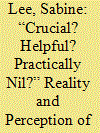

|
|
|
|
|
| Summary/Abstract |
When, in March 1940, two Jewish emigré physicists, Otto Frisch and Rudolf Peierls, composed a memorandum on the technical feasibility of an atomic weapon, few would have envisaged the significance of this six-page document. The technical blueprint for an atomic weapon, at the time assumed to be well beyond the realm of the possible, was to have a significant impact on the Anglo-American nuclear relationship, as it enabled British and American scientists to discuss at eye-level, the direction of nuclear weapons development, as it moved from theory to implementation. Significantly, Peierls and Frisch calculated the critical mass uranium and concluded that the amount of U235 required for a bomb was in the region of kilos rather than tons, as previously thought. The document amplified the British voice in the Anglo-American discussions about the development of nuclear weapons which eventually led to the Manhattan Project, the US-led development of the bombs that would be dropped on Hiroshima and Nagasaki to end the war in the Pacific. Yet, the official history of the Manhattan Project claimed that the British contribution to the successful development of the weapon was ‘in no sense vital’ and the ‘technical and engineering contribution … practically nil’. This paper discusses Britain’s co-operation and competition in the Anglo-American nuclear relationship in the light of scientific collaboration and rivalry during the Second World War.
|
|
|
|
|
|
|
|
|
|
|
|
|
|
|
|
| 2 |
ID:
000616
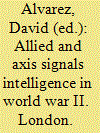

|
|
|
|
|
| Publication |
London, Frank Cass, 1999.
|
| Description |
xii, 229p.Hbk
|
| Standard Number |
0-7146-4958-6
|
|
|
|
|
|
|
|
|
|
|
|
Copies: C:1/I:0,R:0,Q:0
Circulation
| Accession# | Call# | Current Location | Status | Policy | Location |
| 041995 | 940.5485/ALV 041995 | Main | On Shelf | General | |
|
|
|
|
| 3 |
ID:
088126
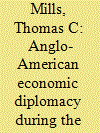

|
|
|
|
|
| Publication |
2009.
|
| Summary/Abstract |
Throughout the Second World War British and American companies competed to gain the contract for the electrification of the central Brazilian railway. The British Foreign Office used this case to establish a broader principle with the U.S. government that the conditions brought about by war would not be used by one country to gain commercial advantage at the expense of the other. While the U.S. government supported this principle in theory, this article argues that they failed to adhere to it in practice. U.S. actions in this case shed new light on the country's economic diplomacy with Britain during the Second World War.
|
|
|
|
|
|
|
|
|
|
|
|
|
|
|
|
| 4 |
ID:
193604
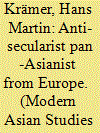

|
|
|
|
|
| Summary/Abstract |
The modern Japanese nation-state that was established from 1868 onwards was marked by a strong tendency towards the separation of state and religion: religions were protected as a private matter, but the public sphere was resolutely kept free of them. This was mainly done so that competing religions would not get in the way of state-sanctioned emperor worship. The latter, although imbued with elements from Shinto, was carefully defined as non-religious, so that emperor worship could be prescribed without harm to the constitutionally guaranteed freedom of religion. This secularist approach to policing religions was broadly shared among Japanese elites—but it did not remain unopposed.
|
|
|
|
|
|
|
|
|
|
|
|
|
|
|
|
| 5 |
ID:
047532
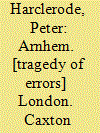

|
|
|
|
|
| Publication |
London, Caxton Editions, 1994.
|
| Description |
192p.Hbk
|
| Standard Number |
1840671467
|
|
|
|
|
|
|
|
|
|
|
|
Copies: C:1/I:0,R:0,Q:0
Circulation
| Accession# | Call# | Current Location | Status | Policy | Location |
| 043240 | 940.5421/HAR 043240 | Main | On Shelf | General | |
|
|
|
|
| 6 |
ID:
095996
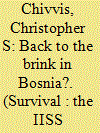

|
|
|
|
|
| Publication |
2010.
|
| Summary/Abstract |
Today in Sarajevo there is disturbing talk of an unravelling of the Dayton Accords that ended the bloody civil war there 14 years ago. Nearly 100,000 people were killed in that war, which pitted Muslims against Serbs against Croats, and saw Europe's nastiest massacres since the Second World War. Since 1995, Bosnia has been at peace, but the main political parties continue to fight over the basic issues that started the war almost two decades ago. Concern over the general political situation has increased as nationalist rhetoric has raised the spectre of a re-division of the country and an ensuing descent into violence. Some in Sarajevo even evoke the possibility of 'European Gazas' emerging in some parts of the county, where there are hints that unemployed Muslim youth may be coming under the influence of a radical, foreign brand of Wahhabist Islam.
|
|
|
|
|
|
|
|
|
|
|
|
|
|
|
|
| 7 |
ID:
000939
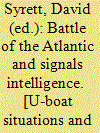

|
|
|
|
|
| Publication |
Aldershot, Ashgate, 1998.
|
| Description |
xxxi,628p.Hbk
|
| Standard Number |
1840142952
|
|
|
|
|
|
|
|
|
|
|
|
Copies: C:1/I:0,R:0,Q:0
Circulation
| Accession# | Call# | Current Location | Status | Policy | Location |
| 040399 | 940.545/SYR 040399 | Main | On Shelf | General | |
|
|
|
|
| 8 |
ID:
047352
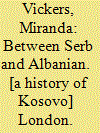

|
|
|
|
|
| Publication |
London, Hurst and Company, 1998.
|
| Description |
xix, 328p.pbk
|
| Standard Number |
1850653585
|
|
|
|
|
|
|
|
|
|
|
|
Copies: C:1/I:0,R:0,Q:0
Circulation
| Accession# | Call# | Current Location | Status | Policy | Location |
| 044857 | 949.71/VIC 044857 | Main | On Shelf | General | |
|
|
|
|
| 9 |
ID:
039683
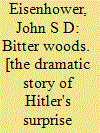

|
|
|
|
|
| Publication |
London, Robert Hale and company, 1969.
|
| Description |
481p.Hbk
|
| Standard Number |
709111460
|
|
|
|
|
|
|
|
|
|
|
|
Copies: C:1/I:0,R:0,Q:0
Circulation
| Accession# | Call# | Current Location | Status | Policy | Location |
| 004373 | 940/EIS 004373 | Main | On Shelf | General | |
|
|
|
|
| 10 |
ID:
027374
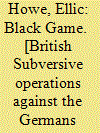

|
|
|
|
|
| Publication |
London, Michael Joseph, 1982.
|
| Description |
xii, 276p.Hbk
|
| Standard Number |
0-7181-1718-2
|
|
|
|
|
|
|
|
|
|
|
|
Copies: C:1/I:0,R:0,Q:0
Circulation
| Accession# | Call# | Current Location | Status | Policy | Location |
| 025026 | 940.5421/HOW 025026 | Main | On Shelf | General | |
|
|
|
|
| 11 |
ID:
006464
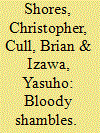

|
|
|
|
|
| Publication |
London, Grub Street, 1996.
|
| Description |
494p.Hbk
|
| Contents |
Vol.2: The defence of sumatra to the fall of Burma
|
| Standard Number |
0948817674
|
|
|
|
|
|
|
|
|
|
|
|
Copies: C:1/I:0,R:0,Q:0
Circulation
| Accession# | Call# | Current Location | Status | Policy | Location |
| 038166 | 940.544/SHO 038166 | Main | On Shelf | General | |
|
|
|
|
| 12 |
ID:
114170
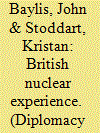

|
|
|
|
|
| Publication |
2012.
|
| Summary/Abstract |
Strategic culture, beliefs, and perceived status in an anarchic international system played a crucial role in the development of British nuclear weapons policy from its inception in the Second World War through to the Nassau Agreement in 1962 that provided Britain with a sophisticated submarine nuclear deterrent-Part Two, in the next issue of Diplomacy and Statecraft, will look at the period from 1962 to the present day. Adopting what has been described as a "Conventional Constructivist" approach, the argument is that these ideational factors have helped to shape the character of Britain's nuclear capability and the operational plans for the potential employment of those capabilities. It also provides an insight into how these factors have shaped elite views of the UK nuclear deterrent in the crucial early years of its development.
|
|
|
|
|
|
|
|
|
|
|
|
|
|
|
|
| 13 |
ID:
099666


|
|
|
|
|
| Publication |
2010.
|
| Summary/Abstract |
Like clockwork, at the end of every decade for the last fifty years, the subject of America's decline comes up. As if on cue, for instance, the National Intelligence Council's November 2008 report, Global Trends 2025, argued that "the international system-as constructed following the Second World War-will be almost unrecognizable by 2025 . . . [It] will be a global multipolar one with gaps in national power continuing to narrow between developed and developing countries." This conclusion represented a striking departure from the NIC's view in 2004 that the United States was likely to continue its dominance of the international system.
|
|
|
|
|
|
|
|
|
|
|
|
|
|
|
|
| 14 |
ID:
103315
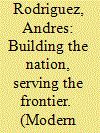

|
|
|
|
|
| Publication |
2011.
|
| Summary/Abstract |
The wartime period between 1937 and 1945 provided an exceptional opportunity for the Guomindang state to experiment with a wide array of schemes that sought to further its nation-state project in the borderland regions of China. Under the rubric of 'frontier reconstruction' (bianjiang jianshe) it devised a series of plans that encompassed both the economic and cultural transformations of these regions. This paper discusses a particular scheme devised by Chinese anthropologist, Li Anzhai (1900-1985), during his stay at the Tibetan Buddhist monastery of Labrang where he sought to transform borderland societies into a modern Chinese citizenry. A key aspect to his strategy was the mobilization of youth where trained cadres and students performed what became known as 'frontier service' (bianjiang fuwu) establishing a dialogue with the community's own particular demands by means of building schools, hospitals and agricultural projects. This paper argues that the notion of 'frontier service' and the 'cultural reconstruction' project propounded by Li not only sought to modernize and unify China around a distinct multicultural identity, it was also an important mobilizing force amongst sectors of wartime youth which arguably introduced young Han Chinese to a region which they had hitherto only imagined in the pre-war period.
|
|
|
|
|
|
|
|
|
|
|
|
|
|
|
|
| 15 |
ID:
164657
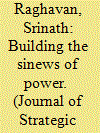

|
|
|
|
|
| Summary/Abstract |
This article analyses the military transformations that India underwent during the Second World War. It focuses on the institutional dimension of these changes and considers the longer-term changes wrought by the war in the composition of the army, the logistical and support infrastructure and the emergence of an indigenous military industrial base. Taken together, the article argues, these changes positioned India as a potential regional military power that was qualitatively different from the interwar period.
|
|
|
|
|
|
|
|
|
|
|
|
|
|
|
|
| 16 |
ID:
127157
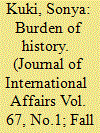

|
|
|
| 17 |
ID:
148463
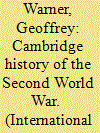

|
|
|
|
|
| Summary/Abstract |
Following on from earlier three-volume histories of the Cold War and the First World War, Cambridge University Press completes a trilogy with this detailed treatment of the Second World War. Multi-authored in the Cambridge tradition, the individual chapters cover a wide range of events and topics and the 81 contributors, mainly but not exclusively from the United Kingdom and the United States, include both scholars who have already established a reputation in the subject as well as those who are in the process of doing so. Perhaps the greatest strength of the volumes is the treatment given to what may be loosely referred to as the Pacific War. No one who uses them properly is going to have any doubts about the nature and importance of the struggle between Japan and its opponents between 1937 and 1945, and it is particularly encouraging to note the use of Chinese and Japanese sources by the authors, when so many English-language books on the subject cite none. The principal weakness of the enterprise is its division into an unnecessarily complicated series of topics, which is not always adhered to by the authors and which often compels the unfortunate reader to skip backwards and forwards, not only within but between volumes. Despite this flaw, however, this remains an important contribution to the history of the Second World War and will need to be consulted by any serious student of the subject for many years to come.
|
|
|
|
|
|
|
|
|
|
|
|
|
|
|
|
| 18 |
ID:
191122
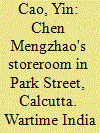

|
|
|
|
|
| Summary/Abstract |
This article is about the experiences of three Chinese men who were involved in smuggling between India and China during the Second World War. Chen Mengzhao's rise as a leading figure in India-China smuggling in Calcutta uncovers the hidden links between the black markets in India and China during the Second World War. Gao Wenjie disguised himself as a Chinese army officer and utilized this fake identity to facilitate his smuggling business. Wang Li-an was sent to Calcutta to undertake smuggling for a Chinese government department. In telling these stories, this article argues that most smuggling in modern India and China was undertaken in transnational contexts that resulted in transnational effects. Ironically, the Nationalist government's state-building project to contain India-China smuggling ended by facilitating it. This project was further perceived by the British authorities as a Chinese conspiracy against India's sovereignty. The misunderstanding between the Chinese and British authorities led to the end of Chinese immigration to India in 1945. Overall, this article provides a new perspective to make sense of the tensions between the Chinese, Indian, and British governments during the Second World War.
|
|
|
|
|
|
|
|
|
|
|
|
|
|
|
|
| 19 |
ID:
103309
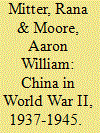

|
|
|
|
|
| Publication |
2011.
|
| Summary/Abstract |
China's long war against Japan from 1937 to 1945 has remained in the shadows of historiography until recently, both in China and abroad. In recent years, the opening of archives and a widening of the opportunity to discuss the more controversial aspects of the wartime period in China itself have restored World War II in China ('the War of Resistance to Japan') to a much more central place in historical interpretation. Among the areas that this issue covers are the new socio-political history of the war that seeks to restore rationality to the policies of the Guomindang (Nationalist) party, as well as a new understanding in post-war China of the meaning of the war against Japan in shaping Cold War and post-Cold War politics in China. In doing so, it seeks to make more explicit the link between themes that shaped the experience of World War II in China to the war's legacy in later politics and the uses of memory of the conflict in contemporary Chinese society.
|
|
|
|
|
|
|
|
|
|
|
|
|
|
|
|
| 20 |
ID:
185868
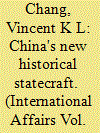

|
|
|
|
|
| Summary/Abstract |
There is a common perception that the Chinese state promotes fabricated accounts of the Second World War and the Communist Party's role in that conflict. Despite a growing scholarly interest in the history and collective memory of China's war experience, this perception has rarely been scrutinized, and the field has been slow to recognize recent shifts in China's memoryscape. This study draws on the concept of historical statecraft to compare official accounts with the historical record and explore how the Chinese party-state uses war memory for political purposes. It finds that its desire for national unity and international recognition have led Beijing to espouse a narrative of the Second World War that, despite significant gaps, is more representative and historically accurate than ever before. Simultaneously, the analysis shows that the Chinese leadership, at what it sees as a high-stakes juncture in China's nation-building project, increasingly monopolizes and mobilizes the memory of the war for the purposes of self-legitimation, control and strategic posturing. Although there are signs of China normalizing and globalizing its history, its official war memory reinforces an inwardly-directed form of Chinese nationalism. Analysts should take Chinese war memory seriously and study the implications of Beijing's new historical statecraft.
|
|
|
|
|
|
|
|
|
|
|
|
|
|
|
|
|
|
|
|
|